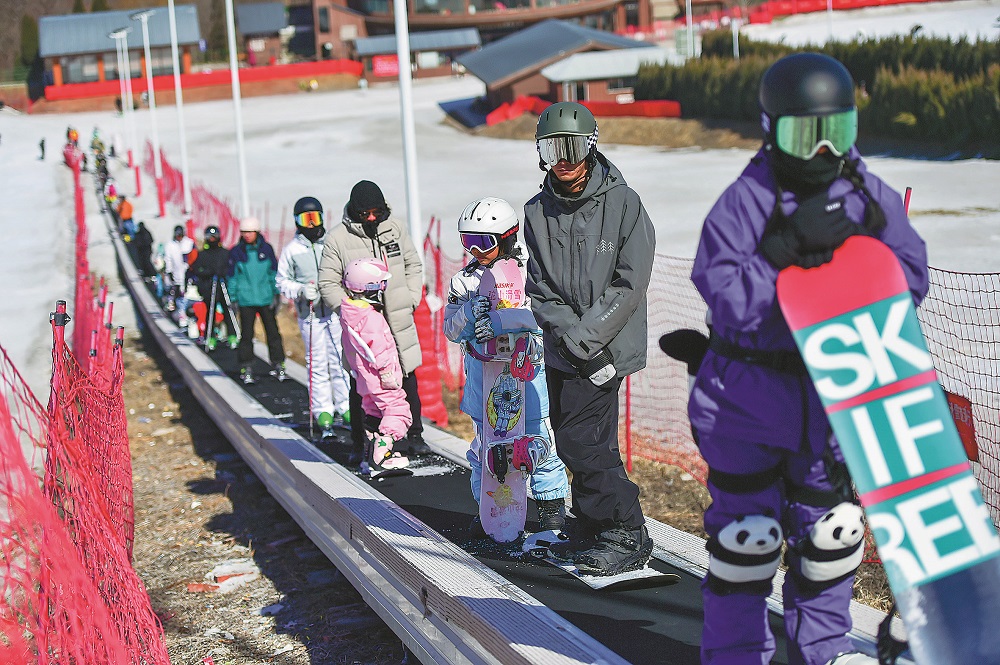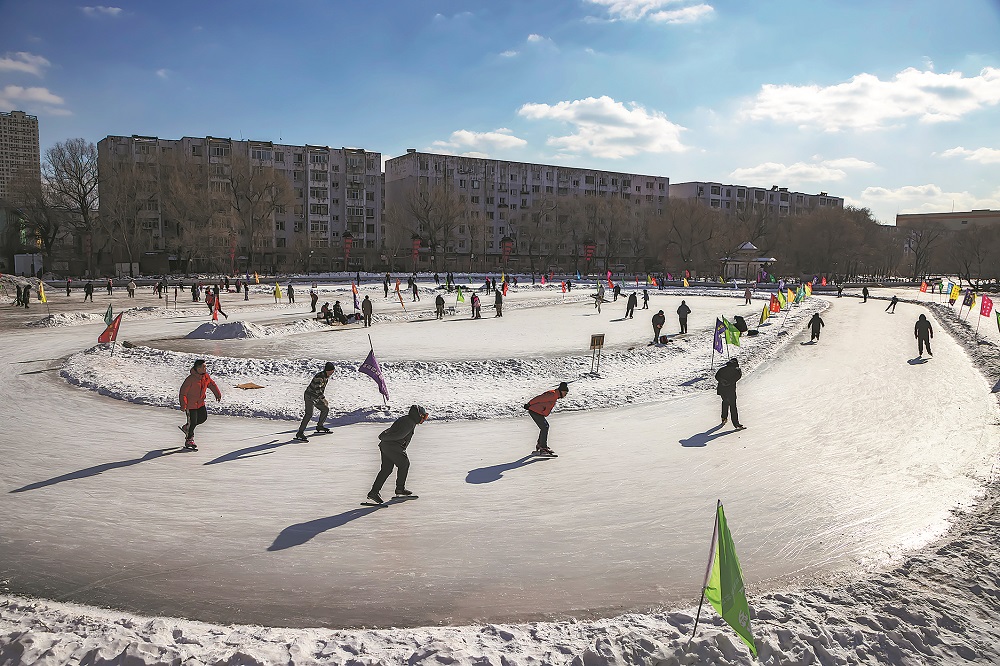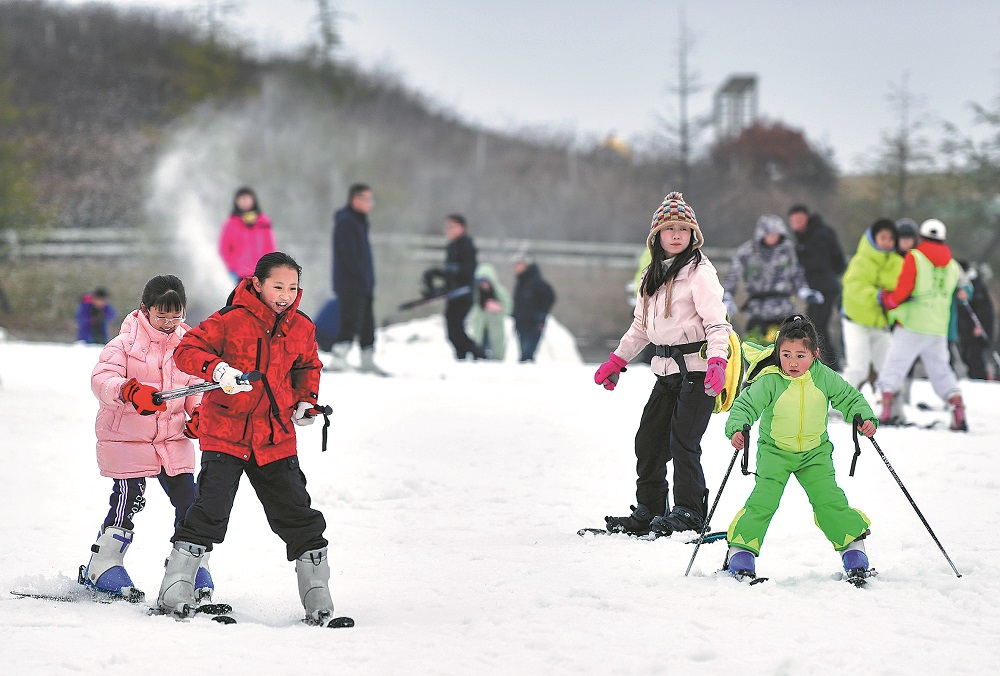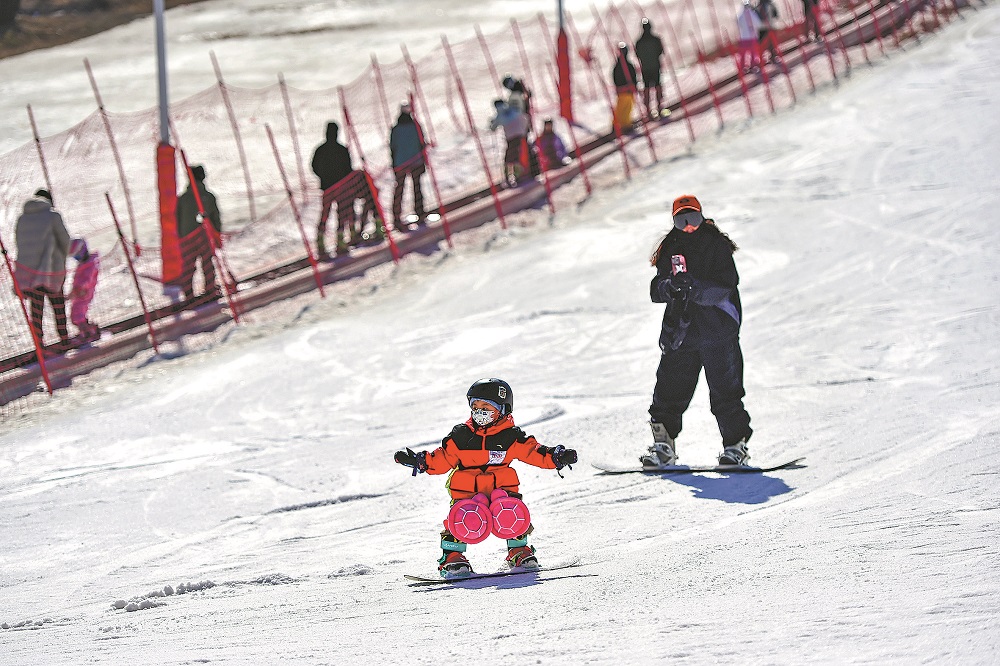
The fulfillment of China's ambitious goal of encouraging 300 million people to participate in ice and snow activities has facilitated the rapid expansion of the winter sports industry in the country. WANG JILIN/FOR CHINA DAILY/XINHUA
Backed up by surging public interest and robust market demand, international governing bodies and business insiders remain bullish on the growth potential of China's winter sports industry three years after Beijing 2022.
As this winter starts to give way to spring, the bustling scenes at the Yanqing National Alpine Ski Center in northwestern Beijing suburbs showed no sign of season-ending stagnancy over the weekend, with skiers queuing up at the gondola station entrance from about 9 am on Saturday, and all the three parking lots at the resort already full before lunchtime.
The country's only Olympic-standard alpine resort, despite its high-difficulty slopes and challenging terrain, has grown more popular than expected among ordinary skiers, dispelling concerns over a potential lack of use after hosting the thrilling alpine events at the Beijing 2022 Winter Games.
The perceived post-Olympics business slump, which some investors and pundits worried might happen, has never materialized. Instead, the strong pace of growth in the sector, driven by the hosting of more major events and soaring demand for winter tourism and leisure activities, has gone beyond some of the boldest predictions before Beijing 2022.

The fulfillment of China's ambitious goal of encouraging 300 million people to participate in ice and snow activities has facilitated the rapid expansion of the winter sports industry in the country. WANG JILIN/FOR CHINA DAILY/XINHUA
"To be honest, we had our concerns (before Beijing 2022) that the rapid development of the winter sports industry would slow down after the Olympics," Zhang Li, co-president of Asian Digital Group, a market researcher and business incubator, told China Daily during a winter sports forum held at the NASC on Friday.
"Yet, here we are, witnessing an even stronger boom than we could have imagined a couple of years ago. Winter sports development in our country has ushered in a new era since the closing of Beijing 2022.
"Initiated by a government push to host the Beijing Winter Olympics, the development of ice and snow sports, and all related leisure activities, has now been able to stand on its own, driven by the demand from an emerging consumer market."
Zhang's sentiment is backed up by the latest figures.
Since the beginning of November, 934 ski resorts, across 31 provinces and municipalities in China, had received 151 million visits by Feb 4, a 27.8 percent increase from the same period a year ago, according to data from the General Administration of Sport of China.
Northeast China's Heilongjiang province, which hosted the 9th Asian Winter Games earlier this month, has turned out to be the most popular tourism destination this winter, after having accommodated over 16 million skiers and snowboarders over the past three months, a 7.3 percent rise from last winter.

The fulfillment of China's ambitious goal of encouraging 300 million people to participate in ice and snow activities has facilitated the rapid expansion of the winter sports industry in the country. WANG JILIN/FOR CHINA DAILY/XINHUA
The number of inbound tourists visiting the country's ski resorts has also reached a new high at 518,000, so far, this season, representing an annual rise of 29.8 percent from last year.
"Obviously, the hosting of more world-class events, such as the Asian Winter Games in Harbin, provides a big help in maintaining the momentum," Zhang said.
"From going abroad to learn from the world's best, to attracting visitors from our own surrounding markets, I think that speaks volumes for the progress of China's winter sports industry," she added.
Launched in 2016 by ADG and the Beijing Olympic City Development Association, the annual World Winter Sports (Beijing) Expo, which will celebrate its 10th anniversary this fall, is expected to attract record numbers of exhibitors, visitors and new signings when it is staged in October, according to Zhang.
Guest speakers, executives and officials attending the forum, organized by Advantage Austria, a trade promotion organization hailing from a country that has a long history as a winter sports powerhouse, all agreed that the market potential in China remains untapped, and that there are business opportunities that have not yet been fully explored.

The enthusiasm for winter sports is evident from the growing public participation in ice and snow activities and the number of related venues opening up across the country. WANG JILIN/FOR CHINA DAILY
With Chinese resort developers and event promoters having already upgraded their equipment and facilities up to international standards, operational expertise in business diversification and customer services could still use more input from the world's established players, according to Erik Riegler, a staff member in charge of cooperation and relationship development at the Austrian Embassy in Beijing.
"You should focus on different target groups to differentiate the products and services, not only serving those people who come to ski, but also others who want to experience the mountains, outdoor events and maybe some other cultural activities," Riegler suggested in regard to China's resort operations, citing experiences from Austria's renowned winter tourism industry.
With both countries having hosted the Winter Olympics and staged winter sports World Cup events on a consistent basis, Riegler also suggested Chinese organizers could tap the deeper potential in the commercial operation of sporting events.
"You have to offer more than just watching the event, there should be entertainment choices for all those target groups, whether it's good food, a lively bar with music or a spa for relaxation and therapeutic treatments," he said.
As the forum continued at the alpine resort, the National Sliding Center, another Beijing 2022 Olympic venue located just across the ridge, hosted the final leg of the 2024-25 International Luge Federation World Cup series, offering visitors to the Yanqing Olympic park another thrilling way to spend the weekend — watching an international cohort of daredevil luge racers hurtling down the frozen track on a small sled.
Thomas Bach, president of the International Olympic Committee, hailed the legacy of Beijing 2022 again last week after a visit to the Chinese capital.
"The legacy of the Olympic Games is working," Bach said after a tour of the Beijing Olympic Museum on Thursday.
"After Beijing 2022, winter sports have become so popular in China, that we can now speak them in global terms," said the former German Olympic fencing champion, who is due to step down from his position in June at the end of his second term.
"This is what a legacy is about: ensuring that future generations can benefit from the Olympic Games. China is an extraordinary display of that."